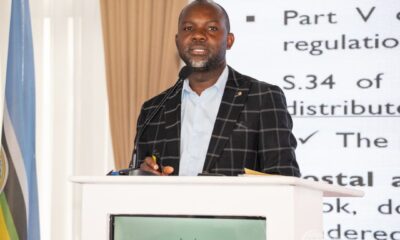Politics
IT’S ALL HER FAULT!! Bobi Wine’s Blue Eyed Boy Ssenyonyi Accuses Justice Abodo For Besigye Being Tried In The Military Coirt

Opposition leader Joel Ssenyonyi has publicly accused the Director of Public Prosecutions (DPP), Jane Frances Abodo, of failing to implement a Supreme Court directive. According to Ssenyonyi, this failure is why Dr. Kizza Besigye continues to be tried in a military court instead of a civilian one.

Ssenyonyi made the remarks during the vetting of the newly appointed Principal Judge by the Parliamentary Appointments Committee. His comments have intensified debates about judicial independence and the handling of high-profile political cases in Uganda.
The Supreme Court had previously ordered that civilian cases be transferred from military to civilian courts. Ssenyonyi claims that Abodo has not enforced this order, resulting in Besigye’s trial remaining under military jurisdiction—an arrangement many consider inappropriate for a civilian.

During the vetting session, MPs also raised concerns about the growing backlog of cases in Uganda’s courts. They urged the incoming Principal Judge to prioritize addressing these delays, emphasizing that slow justice denies many Ugandans timely access to legal remedies.
Ssenyonyi’s accusations highlight frustrations among opposition leaders regarding the treatment of political figures within the legal system. Besigye, a veteran opposition politician, has had his trial closely monitored both domestically and internationally.

Critics argue that military courts should be reserved for cases involving national security or military personnel. Trying civilian politicians in such courts raises serious questions about fairness, transparency, and the protection of fundamental legal rights.
As the vetting process continues, public attention remains focused on how the judiciary will handle these concerns. Many Ugandans are watching closely to see whether the new Principal Judge will uphold Supreme Court rulings and ensure that civilian cases, including politically sensitive matters, are tried appropriately in civilian courts.




















